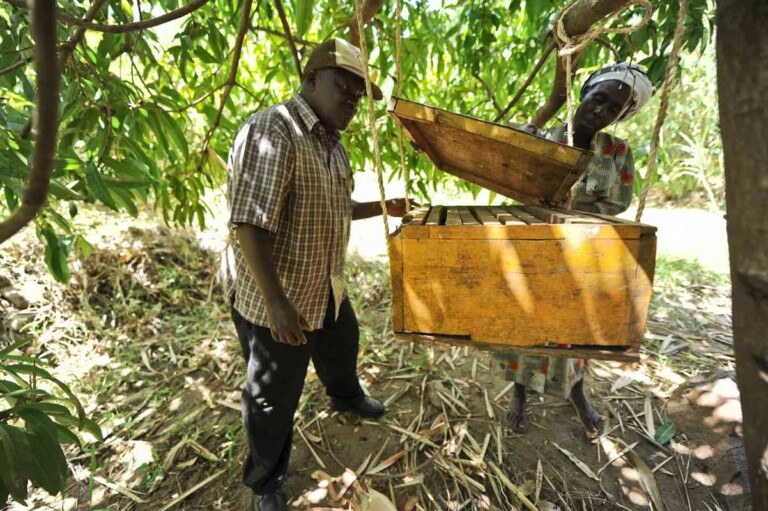Bees vs. Elephants: How Kenyan Farmers are using Honeybees to Protect Crops—and Save Wildlife
2 min read
Beekeepers-in-Kenya-credit-CGIAR-K.-Trautmann-CC
In rural Kenya, around the iconic Tsavo National Park, a peculiar buzz is in the air. African honey bees are busy at work, not just making honey but also guarding crops from elephant raids in a creative solution that benefits both farmers and wildlife.
An Unlikely Solution to a Big Problem
For farmers like Charity Mwangome, it used to be an unending battle against the jumbos, which could storm in at any time, devouring crops and destroying homes. “The beehive fences came to our rescue,” Mwangome shared. “We used to hate elephants a lot.
Elephant numbers in Tsavo have tripled since the 1990s to 15,000 today. That may be great for conservation, but the arrival of so many big mammals has brought friction with local farmers whose livelihoods are under constant threat of being trampled by these marauding beasts.
Turning Farmers into Beekeepers
Save the Elephants countered with a beehive fence installation on farms; a setup costs about $1,000. The upfront cost is prohibitively high, but the honey from these bees can be sold at local markets and has become a precious source of revenue to help offset expenses like school supplies. To date, 49 farmers have joined the initiative, becoming beekeepers themselves as a means of peaceful coexistence with their elephant neighbors.
How Bees Keep the Giants at Bay
Surprisingly, elephants are afraid of bees. The buzz of 70,000 bees can ward them off crop fields. Suspended from wires greased in order to stop badgers, these beehives are a natural alarm system. A too-inquisitive elephant may nudge a wire; disturbed, the bees swarm sending giants running.
A Growing Movement Across Africa
This innovative approach is not unique to Kenya. Various successful beekeeping projects are established in reserves’ areas in Zambia and Malawi. Last year, the International Fund for Animal Welfare distributed nearly 300 beehives to communities in the Malawi–Zambia Transfrontier Conservation Area. The vast conservation area consists of 32,000 square kilometers of parks, reserves, and communal lands where beekeeping is deterring elephants from farmland and benefiting local economies as well as reducing poaching.
African farmers find a sweet solution to a big problem: tiny honeybees’ power harnessed. That keeps crops safe, livelihoods intact, and contributes at the same time to wildlife conservation. Again, Notre Dame rings its bells to chime, a hopeful sound for its people in Paris–a telling sign of resilience and celebration over the soon-to-return iconic cathedral.







